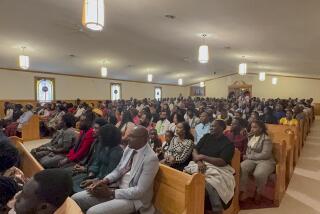Slayings Spread Anger, Distrust in Little Haiti : Investigation: Residents say officials ignore the politics behind deaths of 4 Aristide supporters in Miami.
MIAMI — In Little Haiti, storefront rallies regularly spill into the street. Walls are replastered daily with fresh broadsides against enemies. Shade-tree discussions begin hot and grow hotter. Everything seems political.
Especially murder.
When Daniel Buron was gunned down in front of a friend’s house last week--making him the fourth well-known supporter of exiled Haitian President Jean-Bertrand Aristide to have been assassinated here since 1991--another wave of fear swept through the enclave of 60,000 people.
In the markets and barbershops, men and women talk passionately about the perils of speaking out and shake their heads over the tragedy of the bloodletting. But few express surprise.
“We are used to threats and to death,” said Rolande Dorancy, executive director of the Haitian Refugee Center. “We have learned to live with that.”
The failure of the police to make any arrests in connection with the slaying of Buron, 31, an outspoken political activist, has renewed concerns that solving murders in the Haitian community is not a high priority.
The three earlier victims were all popular radio broadcasters. Although three arrests have been made in connection with those slayings, the triggermen have not been identified.
“If leaders in the Cuban community were being shot this way, the FBI and the White House would be tripping over each other trying to solve this as a national priority,” said Steven Forester, an attorney for the refugee center. “But these are black Haitians, without political clout, and it seems like it’s open season on exiles here.”
Buron was killed minutes after leaving an evening executive council meeting of Veye Yo, a pro-democracy political group whose name means “watch them” in Creole. Standing in front of a friend’s house, Buron was talking to the friend and another man on March 9 when two gunmen approached on foot.
Without a word, witnesses say, the strangers opened fire with automatic weapons. Buron was hit several times. His two companions escaped injury by diving under a nearby car.
Police say they are uncertain if Buron was an assassination target. Miami Police Detective George Gil says the two gunmen may have been would-be robbers who got scared, shot and ran.
“His activities were political, so people think the killing has to be political,” Gil said. “But we’re getting very little information from the community on this. They are not talking.”
Haitians are often reluctant to talk to the police. “The nature of the community presents language and cultural problems that make it hard for the police to penetrate,” said Father Tom Wenski, a Creole-speaking priest at Notre Dame d’Haiti here. “People don’t have a lot of confidence in police because of their experience in Haiti.”
In Haiti, both uniformed police and irregulars such as the Tontons Macoute have been brutal enforcers for oppressive regimes, including those of the Duvalier family and the current military government headed by the army commander, Lt. Gen. Raoul Cedras.
This week, diplomats and U.N. observers in Haiti reported that 75 people have been killed and their bodies mutilated recently in an effort to end support for Aristide, the elected president who was forced into exile in 1991.
The first murder of a prominent Haitian in Miami occurred in February, 1991, the same month Aristide took office. Radio personality Jean-Claude Olivier, 47, was walking to his car from a nightclub when he was hit by three bullets.
Twenty-five days later another well-known broadcaster, Fritz Dor, 33, was killed outside his office in Little Haiti. The third broadcaster killed was Dona St. Plite, who was shot last October after a benefit for Dor’s family.
All three men were outspoken supporters of Aristide.
Assistant State Atty. John Kastrenakas says that although the murders of Olivier, Dor and St. Plite were apparently carried out by contract killers, the motives were related to local business dealings and not politics.
Three men have been charged in connection with those killings, but none are accused of being a gunman or the person who paid for the attacks.
“We know who the shooter is, but we don’t have enough evidence to bring charges,” Kastrenakas said. “But I’m not too worried because he’s in jail on other charges.”
Kastrenakas says he is aware of the Haitian community’s mistrust of police investigations and understands the widespread belief that the killings are linked to politics here and in Port-au-Prince.
“If I were hoping to overthrow the government in Haiti, I would want to put forward that theory, too,” he said. “I understand it, but that doesn’t mean I support it. I don’t deal in rumor and innuendo. There is just no evidence of politics here.”
People on the street do not accept that theory.
“Since Aristide’s election, we have had so much of this killing,” said Jesse Mesidor, 26. “We are sure these are not accidents.”
Community leaders also say they find the prosecutor’s version hard to accept. Many powerful figures in the Haitian military, including Cedras and Gen. Prosper Avril, own property, have family members and claim supporters in southern Florida.
“The prosecutor says this businessman, whose name they won’t give, is a major drug dealer,” Forester said. “Well, people know that drug dealers are connected with powers that be in Haiti.”
Dorancy, whose name was on a list of 36 people targeted in an anonymous death-threat letter mailed last fall to the refugee center, says the killings fit a pattern of intimidation being conducted here and in Haiti.
In October, Dorancy’s former nanny in Port-au-Prince was kidnaped and decapitated in a warning “that they will kill me if I don’t shut up,” she said.
More to Read
Sign up for Essential California
The most important California stories and recommendations in your inbox every morning.
You may occasionally receive promotional content from the Los Angeles Times.










